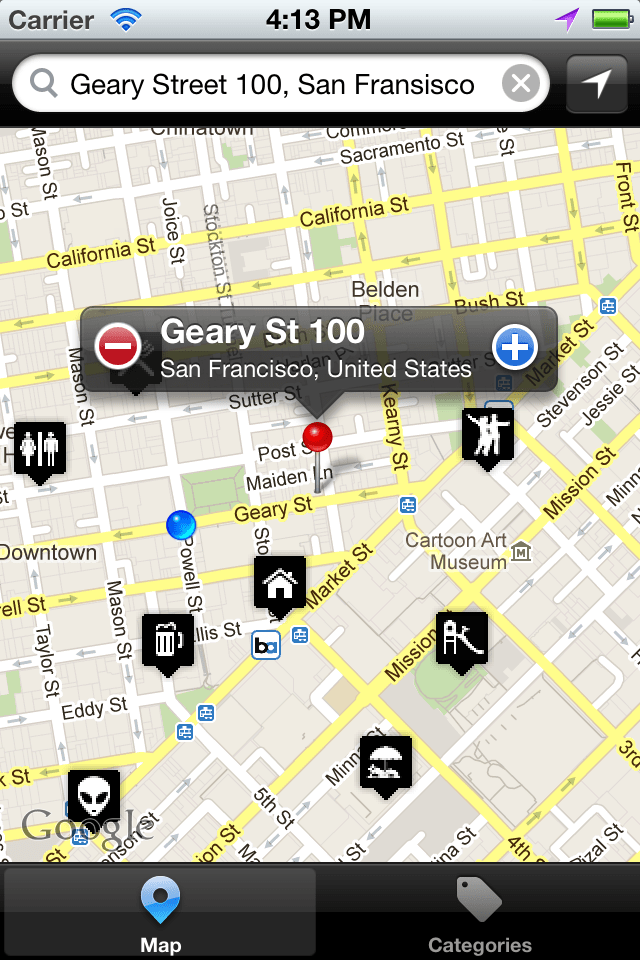CLGeocoder fails silently
I’m currently developing a location-based app for iPad and iPhone, that will allow users to store locations and use custom icons and colors for the pins.
This is how it currently looks:

In the app, you can pin your location, pin any place by pressing the map or search for an address, which uses CLGeocoder to find a coordinate for an address.
Searching for addresses hasn’t been working great, though. If I search for a street in my current city, I get results in other towns.
For clarity, this is the exact method body I use to kick off a search operation:
CLLocationCoordinate2D *coord = self.mapView.userLocation.location.coordinate;
CLRegion *region = [[CLRegion alloc] initCircularRegionWithCenter:coord
radius:10000
identifier:nil];
id<ForwardGeocoder> geocoder = [ObjectFactory getForwardGeocoder];
geocoder.delegate = self;
[geocoder encodeAddressString:self.searchBar.text inRegion:region];
I first accepted the bad result as a limitation in CLGeocoder’s Swedish geocoding abilities, but then noticed that the same problem occurred for American addresses as well.
As I couldn’t get things to work, I decided to return to the Google-based geocoder I used before - Björn Sållarp’s BSGeocoder. I tried CLGeocoder, since BSForwardGeocoder didn’t support viewport biasing. As it now does, I decided to give it another try.
The app uses an abstract protocol to define how geocoding is done. This makes it really easy to switch implementations. As I replaced Björn’s approach with CLGeocoder, I also changed the protocol to use CLRegion instead of MKCoordinateRegion.
When I re-added Björn’s code, I changed my wrapper class (that implements the protocol and serves as a bridge between the app and the geocoding) so it used a CLRegion as well. As I did, I faced the same behavior using Bjorn’s implementation.
Since, Björn’s code used to work and now didn’t, I realized that the only difference between the old and new implementations was that I CLRegion instead of MKCoordinateRegion. This made me look into the resulting CLRegion and notice that the center lat/long was zero!
How could this be? I verified that the user location was not zero, so how could
the resulting CLRegion have a zero center? Reading the documentation, I found
the answer:
The identifier must not be nil!
So, all this was due to me using a nil identifier, but the app never gave me so much as a silent warning about this. If I pass in nil as an identifier, which I did:
- I don’t get a nil CLRegion in return, but a region with a nil center.
- I don’t crash the application.
- I don’t get any errors whatsoever.
I instead end up with a valid CLRegion, but invalid properties. Talk about silent crashes.
Discussions & More
Please share any ideas, feedback or comments you may have in the Disqus section below, or by replying on Twitter or Mastodon.
If you found this text interesting, make sure to follow me on Twitter and Mastodon for more content like this, and to be notified when new content is published.
If you like & want to support my work, please consider sponsoring me on GitHub Sponsors.